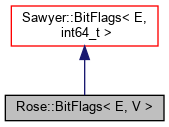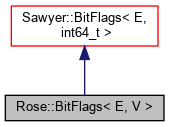Description
template<typename E, typename V = int64_t>
class Rose::BitFlags< E, V >
Stores a vector of enum bit flags.
This is a more self-documenting and terse way to use bit flags. For example, consider this original code:
class TableCharacter {
enum Corner { NONE = 0, LEFT = 1, RIGHT = 2, TOP = 4, BOTTOM = 8 };
unsigned current; // bit vector of Corner flags for current character
unsigned previous; // bit vector of Corner flags for previous character
void process(unsigned next) { // next is vector of Corner bit flags
if ((current & LEFT) != 0) {
previous |= LEFT;
current &= ~LEFT;
}
if ((next & TOP) == 0) {
current &= ~TOP;
current |= BOTTOM;
}
}
};
Now rewritten to use this class:
class TableCharacter {
enum Corner { NONE = 0, LEFT = 1, RIGHT = 2, TOP = 4, BOTTOM = 8 };
BitFlags<Corner> current;
BitFlags<Corner> previous;
void process(BitFlags<Corner> next) {
if (current.testAndClear(LEFT))
previous.set(LEFT);
if (next.isClear(TOP))
current.clear(TOP).set(BOTTOM);
}
};
Definition at line 59 of file Rose/BitFlags.h.
#include <BitFlags.h>
Inheritance diagram for Rose::BitFlags< E, V >:

Collaboration diagram for Rose::BitFlags< E, V >:

Public Types | |
| typedef E | Enum |
| typedef V | Vector |
 Public Types inherited from Sawyer::BitFlags< E, int64_t > Public Types inherited from Sawyer::BitFlags< E, int64_t > | |
| typedef E | Enum |
| typedef int64_t | Vector |
Public Member Functions | |
| BitFlags () | |
| Default constructor with all bits clear. | |
| BitFlags (Vector v) | |
| Construct bit vector from value or bit. | |
| BitFlags (Sawyer::BitFlags< E, V > bf) | |
| std::string | toString (std::vector< int64_t > constants, const char *(*stringifier)(int64_t)) const |
| Convert to string. More... | |
 Public Member Functions inherited from Sawyer::BitFlags< E, int64_t > Public Member Functions inherited from Sawyer::BitFlags< E, int64_t > | |
| BitFlags () | |
| Default constructor with all bits clear. | |
| BitFlags (Vector v) | |
| Construct bit vector from value or bit. | |
| BitFlags (E e) | |
| Vector | vector () const |
| Current value of the bit vector. | |
| bool | isSet (Enum e) const |
| Test whether a bit is set. | |
| bool | isAllSet (BitFlags other) const |
| True if all specified bits are set. | |
| bool | isAnySet (BitFlags other) const |
| True if any of the specified bits are set. | |
| bool | isAnySet () const |
| True if any bit is set. | |
| bool | isEmpty () const |
| True if no bits are set. | |
| bool | isClear (Enum e) const |
| Test whether a bit is clear. | |
| BitFlags & | set (Enum e) |
| Set the specified bit. | |
| BitFlags & | set (BitFlags other) |
Set all bits that are set in other. | |
| BitFlags & | clear (Enum e) |
| Clear the specified bit. | |
| BitFlags & | clear (BitFlags other) |
Clear all bits that are set in other. | |
| BitFlags & | clear () |
| Clear all bits. | |
| bool | testAndClear (Enum e) |
| Test whether a bit is set, then clear it. | |
| bool | testAndSet (Enum e) |
| Test whether a bit is set, then set it. | |
| BitFlags & | operator= (Vector v) |
| Set the vector to an exact value. | |
| BitFlags & | operator= (BitFlags other) |
| Set the vector to the same as another. | |
| std::vector< Enum > | split (std::vector< int64_t > constants, Vector &leftovers) const |
| Split a vector into the individual enum values. More... | |
| std::vector< Enum > | split (Vector &leftovers) const |
| Split a vector into the individual bits values. | |
| BitFlags | operator| (BitFlags other) const |
| Create a new vector that's the union of two vectors. | |
| BitFlags | operator| (Enum e) const |
| Create a new vector that's the union of two vectors. | |
| BitFlags | intersection (BitFlags other) const |
| Create a new vector that's the intersection of two vectors. | |
| BitFlags | intersection (Enum e) const |
| Create a new vector that's the intersection of two vectors. | |
| BitFlags | operator& (BitFlags other) const |
| Create a new vector that's the intersection of two vectors. | |
| BitFlags | operator& (Enum e) const |
| Create a new vector that's the intersection of two vectors. | |
| bool | operator== (BitFlags other) const |
| Compare two vectors. | |
| bool | operator!= (BitFlags other) const |
| Compare two vectors. | |
| bool | operator< (BitFlags other) const |
| Compare two vectors. | |
| bool | operator<= (BitFlags other) const |
| Compare two vectors. | |
| bool | operator> (BitFlags other) const |
| Compare two vectors. | |
| bool | operator>= (BitFlags other) const |
| Compare two vectors. | |
Member Function Documentation
◆ toString()
template<typename E , typename V = int64_t>
|
inline |
Convert to string.
Converts a bit vector to a string of the form "NAME1|NAME2|...". The constants are the individual enum flags, and the stringifier is a function that converts each of those constants to strings.
Definition at line 79 of file Rose/BitFlags.h.
References Sawyer::BitFlags< E, int64_t >::split(), and Sawyer::BitFlags< E, int64_t >::vector().
Here is the call graph for this function:

The documentation for this class was generated from the following file:
 1.8.17
1.8.17